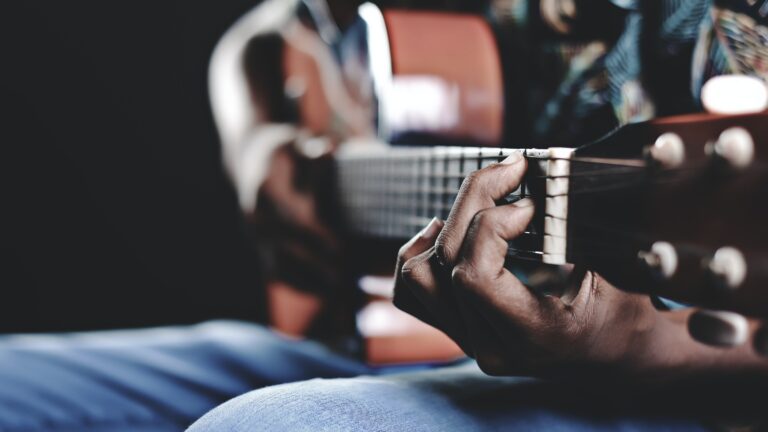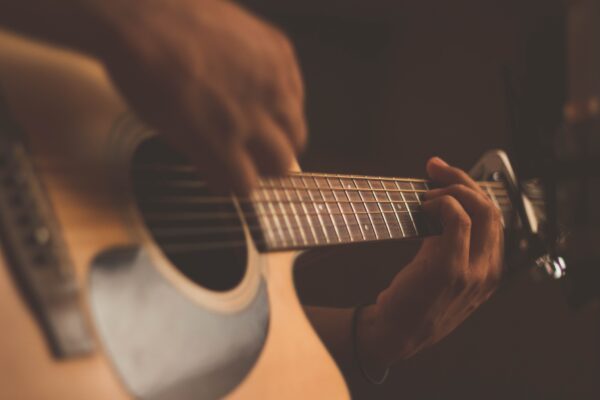Table of Contents
The majority of the guitar players feel utterly discouraged when they start their journey, which is commonly referred to as guitar frustration. If you are thinking why is learning guitar so difficult, you’re not all alone in this world.
The guitar is hard to learn because you need to force your fingers and hands to perform very complex jobs that are not natural for them. Plus, some physical issues like fingertip pain or soreness are linked with guitar learning which is difficult for new players to adapt to.
In this detailed guide, we will talk about why guitar learning is so difficult, how often should a beginner guitarist practice, and more.
Why Is Learning Guitar So Frustrating?
Learning how to play guitar becomes frustrating due to multiple factors. Some reasons are obvious such as physical pain due to harder strings and neck and back pain when you lift a bulky instrument around your shoulders.
Since new guitar players are not used to this, it takes some time before they can finally master the instrument, and the physical effort required to play. But this does not stop here, and there are other reasons that make it difficult to learn how to play guitar.
For instance, it’s hard to memorize notes, scales, and chords when you first start playing. Learning a new song, or a new lick can take days instead of a few minutes for experienced guitarists.
Here are some of the main reasons why learning guitar can be so difficult:
Physical effort
Yes, although playing guitar is not a sport it requires physical effort mostly on your hands. Your hands, wrists, arms, and fingers are not used in any way for these types of movements. This is one of the reasons why it can be so complicated to learn the guitar.
One thing is to be able to press a single note like a piano player, but when it comes to playing guitar it is a lot more difficult. You need to be able to hit the string at the right tempo while pressing the strings. This is a complex task to ask your body. At the same time trying to remember the exact position of the note can also be difficult.
Piano players are able to easily visualize each note, but guitar players will find this very hard in the beginning since they barely see which string they are hitting.
Your hands need to adapt
Another reason is that your hands need to constantly adapt to rapid movements and changes of position. This requires coordination as well as precision. You will need to practice constantly in order to develop the skills required to just change chords, and hit the notes at the right tempo.
While you are still in this adaptation period, you may also experience pain in your fingertips, on your lower back, and even your shoulders. Another common injury is guitar wrist pain, which you should try to avoid at all costs.
Once again if we compare learning guitar with playing the piano, it is a great disadvantage. Not only do you need to have the right guitar posture, but you also need to have perfect hand positioning and coordination.
You still need to develop guitar callouses
One of the most painful experiences of learning guitar is developing guitar callouses, and this is especially true if you are learning on an acoustic guitar instead of an electric guitar.
In the early stages, it is painful to hold the strings in place and to press them for long periods of time.
This initial pain only goes completely away after the first month, and after the first week of learning, you will start to notice the pain goes considerably down. However, this all depends on how much you actually practice.
Guitar chords can be complicated to master
Guitar chord shapes vary a lot, and when you are trying to play an instrument that makes it even more difficult. This makes it difficult because you have to memorize the most common open chord shapes, as well as other variations.
Mastering chord changes is also one of the biggest challenges beginner guitar players need to tackle.
To master scales you need to practice them over and over again
Playing guitar is not only about chords, and strumming you also need to practice scales. There are tons of different scales, and in order to memorize them, you will need a lot of practice.
Once you have mastered one simple scale you still need to be able o play it all over the fretboard, and this is another reason why guitar scales require a lot of practice. While playing scales on the piano is easy because you simply slide the same shape to the left or right side on the guitar it is a lot more complicated.
Strumming patterns require you to know a lot of rhythms
Once you have mastered chord changes and you can play a few simple songs, you still need to develop your strumming rhythm. This takes a lot of time to master, and it is particularly difficult because some songs require specific strumming patterns.
Until you start mastering a few strumming patterns you will find it hard to play songs exactly like they sound. This requires additional practice.
Is It Harder To Play Acoustic Or Electric Guitar?
If you are thinking of learning a guitar, you might be confused when it comes to choosing between acoustic, or electric. Which one is harder to play and why?
Yes, it is harder to play acoustic guitar than an electric guitar and the main reason is that the strings on the acoustic guitar are thicker. This makes it a lot more difficult in the beginning to press the strings, and to play chords.
There are plenty of other reasons that make acoustic guitar harder than electric:
- It takes longer to develop guitar calluses on an acoustic guitar because the strings are heavier. However, it is inevitable to have sore fingertips while learning guitar, either acoustic or electric. But your fingers won’t hurt as much if you learn on an electric guitar.
- To become a pro guitar player, you must be proficient in holding barre chords. Holding barre chords on an acoustic guitar is much harder than on an electric guitar. Because you have to press down heavier strings, with your index finger.
- When you finally start to play some basic chords, and melodies you want to experiment with other techniques like legato, staccato, and bending. Applying these essential guitar techniques on an acoustic is a lot more difficult than on an electric guitar due to the gauge of the strings.
Does Learning Guitar Get Easier?
Learning to play guitar can be complicated in the early stages, but as you progress and become better it does get easier. You have to overcome many obstacles when you start, but as you start to gain some experience it will be easier to learn new songs, solos, or licks.
In order to become easier, you need to keep practicing regularly and follow a pre-established practice routine. Every practice session you should go over a few songs you are learning as well as some important exercises.
Once your fingers, hands, and arms get used to having to constantly apply pressure on the guitar strings, you can start practicing for longer hours. This is when you will be able to make really improve your playing.
You can become easily become a great guitar player within a year if you keep practicing and working on improving your flaws.
One of the most important parts of learning how to play the guitar is to always push yourself outside of your comfort zone. Either learning new and more difficult songs, to experimenting with different scales and techniques. This is the only way that you will see meaningful progress. If instead, you keep practicing the same song you already know over and over again you will not make much progress.
How long should I practice guitar?
This is perhaps one of the most difficult questions to answer because it really depends on how good you want to get. You can only improve if you practice, and without a consistent practicing schedule, you won’t be able to get meaningfully better.
If you really want to master the instrument you should practice as often as possible. It should also be important to draw a line between practicing with a well-established practicing routine or just noodling around.
To become a better guitar player is not just about practicing. You need to become a master at practicing, and that means pushing yourself always to the limit of your abilities.
Let’s keep in mind that Charlie Parker, one of the most influential and outstanding musicians of the 20th century practiced for over 11 hours every day, for 3 to 4 years. This can be applied to musicians but also to other professionals. In order to truly stand out from the crowd, you really need to do what others are not willing to do.
Why practicing is so important
Practice, practice, take a break, and practice again! Why is practicing such an important part of being a better musician? It creates a positive feedback loop! When you start learning guitar you can barely learn a new song every week. As you progress you start to learn faster and faster.
This is when you start to get extremely motivated. As you practice more and more, and you see your improvement in real-time over a span of a few days, it has an amazingly uplifting effect that only makes you want to practice even more.
How Do Guitarists Play So Fast?
Guitarists are able to play so fast due to constant practice. Think of it this way, when you are a baby you can only crawl. This is the equivalent of picking up a guitar for the first time.
When you are able to stand up and take your first steps, this is the equivalent of being able to play a simple song on a guitar.
When you start walking and running, it is the same with playing guitar – it’s all a matter of practice. Remember that practice makes perfection, and it takes a lot of hours of dedication, effort, and study to be able to play the guitar very fast.
Think of shredders are the equivalent of an Olympic runner in the 100m, they only get there because they practice relentlessly.
How to play the guitar faster
Both your hands need to be stronger and synchronized with each other to play the guitar fast. For this, you need to practice regularly to achieve this level. As soon as you are proficient in playing it slowly, increase your speed gradually. Over time, you will notice a significant change in your speed.
You can also compare it to weightlifting. In weightlifting, you start with lighter weights and then try to exceed your limits slowly and slowly.
After practicing with heavier weights, lighter weights will become extremely easy to handle. The same is true in the case of practicing speed. Remember to always use a metronome, and start practicing as slowly as possible. It is better to repeat an exercise at a low speed than to try to play it faster without being able to do so.
How often should a beginner play guitar?
According to a report by Fender, almost 90% of guitarists quit learning guitar in their first year.
The high number of quitters shows that learning guitar is not an easy task, and it requires a lot of dedication and effort. The learning process can be slow and painful in the beginning, but it is very important to not give up. Remember to have self-discipline, time, patience, and most importantly regular practice.
The time a guitar player will take to become good is correlated with the number of hours he dedicates to practice. Always remember that practice is the only way to become better. Not only do you start developing the habit of playing but you can also build muscle memory.
This creates the positive feedback loop we mentioned above and reduces guitar frustration.
Can I Teach Myself Guitar?
Yes, you can learn guitar by yourself if you practice consistently and follow the right advice. Learning a guitar is a hard job in the beginning whether you start learning by yourself or take help from a guitar teacher.
However, you will face many problems when learning a guitar yourself without any teacher. Because you don’t know what you need and where to start learning. However, today there are several resources online, like books for beginners, videos, and even full courses.
For effective learning, you will have to come up with a practical plan and practice techniques. Following a proper plan will make your learning process very easy. Follow the steps below for easy learning:
- Buy a guitar that excites you to play
- Try to follow a solid practice routine without missing even a single day
- Instead of rushing, spend some time developing solid skills
- Find out the best resources to learn guitar. For example, look at different YouTube channels and subscribe to a channel that you can easily follow.
- Don’t go with resources that claim to make you a guitar master within 30 days. There is no secret to learning guitar in this short period so don’t believe in the secret formulas.
Conclusion
Learning how to play guitar can be difficult and demoralizing at times, and that is why you need to have a strong mindset and practice relentlessly to become better every day. If you strive to learn a new thing on your guitar every day you should quickly start to see improvement in a matter of a few weeks.

I have been playing guitar for the past 15 years, and my knowledge and passion for guitars prompted me to start Guitaresque to share my knowledge, tips, and tricks with other guitar players. The sole purpose of this website is to help and inspire guitar players worldwide, to improve their playing and their love for guitars.









